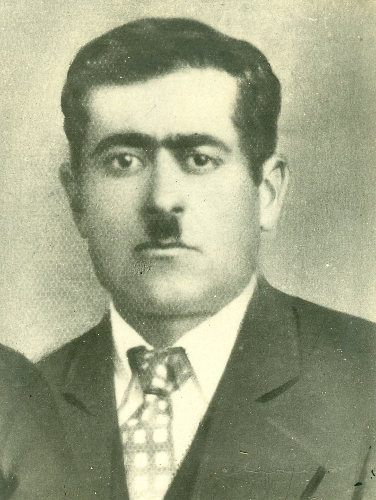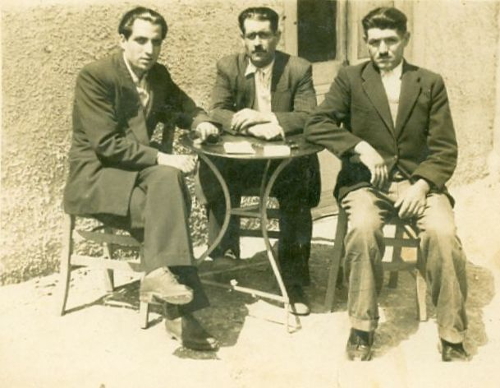Bravery in a Stormy Sea
Story told by Michalis E Papavassilis

During the occupation we went by local rowing boats to Pigadia to bring up to the north the food supplies that the government had provided. This also continued during the English occupation. Michalis Tsapoukis and Manolis Protopapas who owned the boats, took us as oarsmen. We unloaded the goods from the supply ship. The Italians (and later the English) weighed the foods and we gave them to the merchants in Diafani. And they gave them to the people, in the presence of the police to ensure that no one took more than they should. It was the 10th of January 1945. I remember the date because there is a local song which starts "On the 10th of January, in the heart of winter".

We were in Pigadia to bring food with the boat of Manolis Protopapas. When we had unloaded the boat, it was already night but we needed to get the food to the north for the people were starving. There was no moon. Uncle Manolis said "I don’t like this night. The wind is south-easterly, sirocco and it will get stronger. We are tired. There is no moonlight." We said "No, we go. If you don’t want to come, stay here!" He said "We will drown!" We insisted and Uncle Manolis backed down. We loaded the boat by lamplight, got aboard and set sail from Pigadia.
When we passed the rock in Pigadia bay the boat was pitching and rolling and it was very hard to row. We had two sails from smaller boats and we raised one of them. One man shouted but we could not hear his voice because of the wind and the sea. I rowed but I could not row well because the whole length of the oar was in the water. I had to take the oar out of the water and lie it in the boat. Then I took a metal container and started to bail water from the boat and the three other oarsmen continued to row as well as conditions would allow. This situation continued as we left the bay. Then we stopped a second oar and raised the second sail, so we had two oars and two sails and two of us bailing water. Of course we did not know what direction the captain was steering as we were all too busy with our work! We hardly had time to breathe and we could not see one another in the dark. The captain listened to the waves and when he heard big waves coming he steered the boat with the waves otherwise we would have capsized! Time after time!
Time passed in this way until suddenly the captain says "Guys! I want the opinion of each oarsman. Tell me where you think we are now, at which point?" At that moment we found waves which we could not cope with and we were in danger of sinking. I said we were in Kyra Panaghia. Another said we were in Aghios Nikolaos. Another Melatha. We were all wrong, nobody was right. "Shall I tell you my opinion?" the captain says. "Where are we, captain?" "We are in Makria Punda." We were so mistaken because we were distracted by all the hard work. If we had not been concentrating we would have drowned.
When we heard this we were encouraged. "We are near, guys! Let’s try harder and we can make it!" The captain says "We are in Makria Punda but far out. Because from Pigadia, I steered for Rhodos!" "But was it necessary to go that far out?" The captain says "Each man knows his job. If we were closer to the coast we would have been in danger of hitting the rocks. You must be far out to reach the bay of Diafani." And the captain was right, the boat was out of control because of the big waves, we needed much time to turn to Diafani. "From hereon" the captain says, "try to guess the places we pass so we do not pass Diafani. If we pass Diafani, the cliffs of Cape Graia will devour us. Now we will get closer so that we can recognise places." I must say that in those days Diafani had no lights and it was easy to sail past. Some time passed with us rowing and riding the waves. We looked to the coast but could see nothing in the total darkness. Not even each other! And the captain tried to steer close to the coast and the boat sailed on. "Try to hear the sound of the waves breaking on the rocks!"

An hour passed with the waves taking us closer to the coast. And then, one moment, we could hear waves breaking but could still see nothing! We had to hear the sound clearly to be sure. Then we could hear the sound of the waves breaking clearly. We worked out the names of the places we passed, one by one, and then we supposed we were off Cape Alatsopounda, but we could not see any lights from Diafani. Only total darkness! The captain says, "All together! We must shout as we work!" We started shouting, all five of us.
Sakellis and Andonis Kastellorisios were in Irini’s kafenion and they heard us! There was the shop where we stored food and they were waiting for us. They opened the door and we saw the light. (Note: There was no electricity so these would have been oil lamps.) And so we arrived. But how to unload the boat with the sea coming right up to the kafenion! We threw the anchor out of the boat and two oarsmen rowed back to keep the boat in position. And the rest of us jumped into the sea and took the sacks on our heads. Two people lifted them onto our heads and we carried them to the storehouse. And then, as we are unloading, it started to rain! Heavy rain! We took the boat and pulled it up to Sakellis’ house. As we were finishing all this work, water poured down the riverbed and a great deal of water poured down both streets and into the sea. We were soaked. We went into the kafenion, closed the door and drank fascomolo until dawn. We could not go to our homes because of the rain and the flooding. I went to Olympus the following evening.
Note: Manolis Makris says that at this point, reliving the experience, Michalis was overcome with emotion and he wept.

